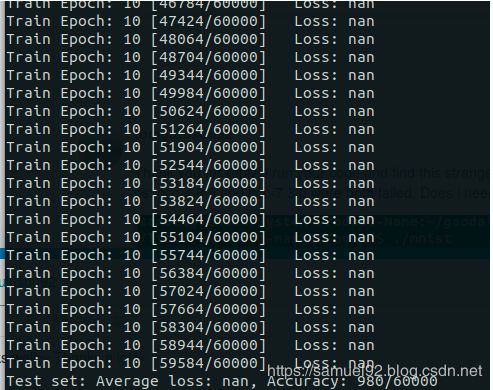PyTorch学习笔记(14) ——PyTorch 1.0 的C++ FrontEnd初体验
在去年12月份,我尝试了一下PyTorch 1.0的C++前端, 当时官方负责PyTorch的C++前端的老哥是: Peter Goldsborough, 当时的C++前端还不够稳定,官方文档提供的demo无法跑通.
所以为了避免后面的同学再次入坑. 本部分将会手把手教你如何用PyTorch1.0 跑通C++ Mnist模型的训练~
0. PyTorch C++接口哲学
PyTorch’s C++ frontend was designed with the idea that the Python frontend is great, and should be used when possible; but in some settings, performance and portability requirements make the use of the Python interpreter infeasible(不可实行的).
For example, Python is a poor choice for low latency, high performance or multithreaded environments, such as video games or production servers. The goal of the C++ frontend is to address these use cases, while not sacrificing the user experience of the Python frontend.
显然, C++前端的目的是为了提供一种跟Python相差不多的接口, 却比Python接口效率高出许多. 在不牺牲用户的开发体验(即跟Python中的实现方式相近,使得用户上手更加方便。)
如此, C++前端在开发时候就遵循了两个哲学:
-
① Closely model the Python frontend in its design(在设计中与Python前端的实现进行尽可能贴近)
在设计中与Python前端的实现进行尽可能贴近, 这意味着C++前端兼具了功能性(functionality)和便捷性(conventions). 虽然C++前端和Python前端可能有一些差异 (e.g., 我们在C++前端中放弃了不赞成的特性或修复了Python前端的“缺陷”), 我们保证, 移植python到C++上仅仅需要做编程语言层面的工作, 而不涉及修改功能或者行为. -
② Prioritize flexibility and user-friendliness over micro-optimization(将灵活性和用户友好性置于微观优化之上)
在C++中, 用户通常可以获得最优化的代码(虽然代价是编写困难和调试问题等(静态语言的特点)). 但是, 灵活性(Flexibility)和动态性(dynamism)是PyTorch的灵魂, 所以我们的C++前端尝试保留这种PyTorch的灵魂-----这意味着在某些情况下可能会为了保持灵活性和动态性牺牲性能.
我们的目的是让不以使用C++为生的研究人员也可以容易的使用C++前端!!!
注意: Python前端不一定会比C++慢!!
Python前端中, 将所有的computationally expensive运算都放到C++里面计算, 因为这些操作会占用程序的大部分时间. 如果您更喜欢编写Python,并且有能力编写Python,我们建议使用Python接口来编写PyTorch. 然而, 无论出于什么原因(不管你是个C++ programmer还是单纯像我一样想尝试一些PyTorch1.0的新feature), 与Python前端类似, C++前端也非常方便、灵活、友好和直观。
最后, 作者认为: 这两种前端的目标不同, 但是他们携手工作(work hand in hand), 没有任何一方可以说无条件的替换对方。
1. PyTorch C++ Mnist例子
刚开始, 我是上官网找的例子: C++ Mnist minimal example, 但是!!!跑步起来, 为了解决这个问题, 我去官方论坛问了一下.
【PyTorch1.0】 C++ mnist demo Error
最后终于解决了, 下面我直接贴代码和环境, 并把当时遇到的坑附上~
1.1 环境
- gcc: 5.5+ (我最开始用的gcc是4.8.5的,会报
段错误!!!)

- g++: 5.5+
- cuda: 9.0
- system: ubuntu18.04
- libtorch: https://download.pytorch.org/libtorch/nightly/cu90/libtorch-shared-with-deps-latest.zip
- cmake: 3.13
1.2 CMakeLists.txt
cmake_minimum_required(VERSION 3.1 FATAL_ERROR)
project(mnist)
SET(CMAKE_BUILD_TYPE "Release")
SET(CMAKE_CXX_FLAGS_RELEASE "$ENV{CXXFLAGS} -O3 -Wall")
find_package(Torch REQUIRED)
option(DOWNLOAD_MNIST "Download the MNIST dataset from the internet" ON)
if (DOWNLOAD_MNIST)
message(STATUS "Downloading MNIST dataset")
execute_process(
COMMAND python ${CMAKE_CURRENT_LIST_DIR}/download_mnist.py
-d ${CMAKE_BINARY_DIR}/data
ERROR_VARIABLE DOWNLOAD_ERROR)
if (DOWNLOAD_ERROR)
message(FATAL_ERROR "Error downloading MNIST dataset: ${DOWNLOAD_ERROR}")
endif()
endif()
add_executable(mnist mnist.cpp)
target_compile_features(mnist PUBLIC cxx_range_for)
target_link_libraries(mnist ${TORCH_LIBRARIES})
1.3 download_mnist.py脚本
这个代码是下载所需要的mnist数据集的脚本代码.
from __future__ import division
from __future__ import print_function
import argparse
import gzip
import os
import sys
import urllib
try:
from urllib.error import URLError
from urllib.request import urlretrieve
except ImportError:
from urllib2 import URLError
from urllib import urlretrieve
RESOURCES = [
'train-images-idx3-ubyte.gz',
'train-labels-idx1-ubyte.gz',
't10k-images-idx3-ubyte.gz',
't10k-labels-idx1-ubyte.gz',
]
def report_download_progress(chunk_number, chunk_size, file_size):
if file_size != -1:
percent = min(1, (chunk_number * chunk_size) / file_size)
bar = '#' * int(64 * percent)
sys.stdout.write('\r0% |{:<64}| {}%'.format(bar, int(percent * 100)))
def download(destination_path, url, quiet):
if os.path.exists(destination_path):
if not quiet:
print('{} already exists, skipping ...'.format(destination_path))
else:
print('Downloading {} ...'.format(url))
try:
hook = None if quiet else report_download_progress
urlretrieve(url, destination_path, reporthook=hook)
except URLError:
raise RuntimeError('Error downloading resource!')
finally:
if not quiet:
# Just a newline.
print()
def unzip(zipped_path, quiet):
unzipped_path = os.path.splitext(zipped_path)[0]
if os.path.exists(unzipped_path):
if not quiet:
print('{} already exists, skipping ... '.format(unzipped_path))
return
with gzip.open(zipped_path, 'rb') as zipped_file:
with open(unzipped_path, 'wb') as unzipped_file:
unzipped_file.write(zipped_file.read())
if not quiet:
print('Unzipped {} ...'.format(zipped_path))
def main():
parser = argparse.ArgumentParser(
description='Download the MNIST dataset from the internet')
parser.add_argument(
'-d', '--destination', default='.', help='Destination directory')
parser.add_argument(
'-q',
'--quiet',
action='store_true',
help="Don't report about progress")
options = parser.parse_args()
if not os.path.exists(options.destination):
os.makedirs(options.destination)
try:
for resource in RESOURCES:
path = os.path.join(options.destination, resource)
url = 'http://yann.lecun.com/exdb/mnist/{}'.format(resource)
download(path, url, options.quiet)
unzip(path, options.quiet)
except KeyboardInterrupt:
print('Interrupted')
if __name__ == '__main__':
main()
1.4 mnist.cpp
关键的训练代码:
#include 1.5 编译&运行
注意, 上面的3个文件需要放在同一级目录下, 然后在这级目录建一个build文件夹, 用常规的cmake ..即可.

2. 参考资料
[1] PyTorch1.0: C++ mnist demo Error
[2] TonyzBi: libtorch-mnist例子